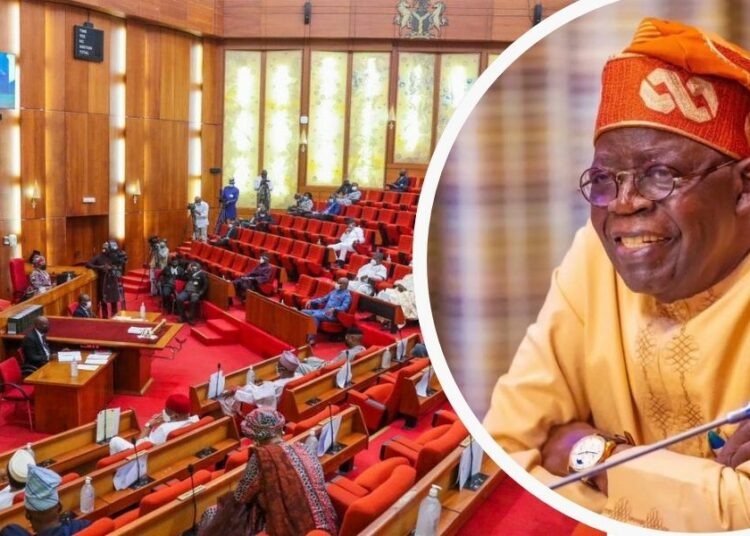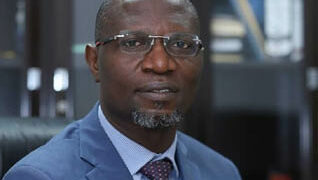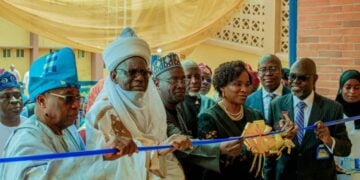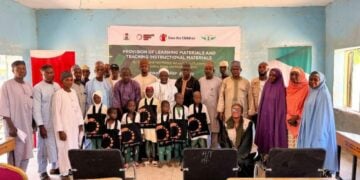The Senate has approved the request of President Bola Tinubu for a comprehensive external borrowing plan amounting to over $21 billion for the 2025–2026 fiscal years.
According to the Senate, the funds are intended to support various national development projects across key sectors, including infrastructure, security, agriculture and human capital development.
During plenary on Tuesday in Abuja, Chairman Senate Committee on Local and Foreign Debt, Senator Aliyu Wamako, presented the long-awaited report, which was first introduced on May 27, 2025.
The delay in its adoption was attributed to parliamentary recesses and challenges in obtaining documentation from the Debt Management Office (DMO).
The approved borrowing package includes “$21.19 billion in direct foreign loans, €4 billion (euros), ¥15 billion (Japanese yen), a $65 million grant, additional domestic borrowing through government bonds totaling approximately ₦757 billion.
The approval also included capital raising of up to $2 billion through a foreign-currency-denominated instrument in the domestic market.
Chairman of the Senate Committee on Appropriations, Senator Olamilekan Solomon (Ogun West), noted that the approval was largely procedural, as most of the items had already been incorporated into the Medium-Term Expenditure Framework (MTEF) and the 2025 Budget previously passed by the Senate.
“The borrowing is already embedded in the 2025 Appropriation Act. With this approval, we now have all revenue sources, including loans, in place to fully fund the budget,” Adeola said.
The decision sparked both support and concern among lawmakers. For his part, Senator Sani Musa (Niger East), clarified that the borrowing plan covers a six-year disbursement period, not just the 2025 fiscal year, and emphasised that Nigeria has not defaulted on any of its existing loan repayments.
“There’s no economy that grows without borrowing. What we are doing is in line with global best practices,” Musa added.
Also, Chairman Senate Committee on Banking, Insurance and other Financial Institutions, Senator Adetokunbo Abiru (Lagos East), reassured the chamber that the loans comply with both the Fiscal Responsibility Act and the Debt Management Act.
He stressed that all funds were designated for capital projects and human development.
“These loans are long-term, concessional, and come with favourable repayment terms. Some have tenors ranging from 20 to 35 years,” Abiru noted.
However, Senator Abdul Ningi of (Bauchi Central) raised concerns about transparency and accountability in the borrowing plan.
He questioned the absence of a detailed breakdown, showing how much each state or agency will receive and how the loans will be repaid.
“We need to tell our constituents exactly how much is being borrowed in their name, and for what purpose,” Ningi said, citing constitutional provisions related to borrowing oversight.
The borrowing plan includes funding for critical national infrastructure, including: “Railways (notably the Eastern Rail Line from Port Harcourt to Maiduguri), Power plants and digital connectivity, Security operations, Agriculture and housing projects.”
Senator Victor Umeh, representing Anambra Central, expressed strong support for the plan, citing the long-awaited investment in the eastern corridor.
“This is the first time I’ve seen $3 billion allocated to rebuild the eastern rail line. That alone justifies my full support,” he said.
In his remarks, Deputy Senate President Jibrin Barau praised the committee’s work and declared that “the entire nation is being carried along” in the borrowing plan.
“This shows that the Renewed Hope Agenda is working. No region is left out,” Barau stated.
The Senate leadership emphasised that all disbursed funds must be used strictly for capital and developmental projects, in accordance with laws governing public finance.





